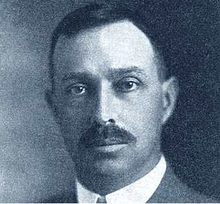Roland Dixon
| Roland Burrage Dixon | |
|---|---|

Roland Burrage Dixon
|
|
| Born | November 6, 1875 Worcester, Mass |
| Died | December 19, 1934 (aged 59) |
| Nationality | American |
| Scientific career | |
| Fields | anthropologist |
Roland Burrage Dixon (November 6, 1875 – December 19, 1934) was an American anthropologist.
Born at Worcester, Mass, in 1897 he graduated from Harvard University, where he remained as an assistant in anthropology, taking the degree of Ph. D. in 1900 and then serving as instructor and after 1906 as an assistant professor. He was vice president of the American Academy of Arts and Sciences in 1910-11 and president of the American Folklore Society from 1907 to 1909. He was professor at Harvard after 1916 and member of the American Commission to Negotiate Peace (1916–18) in Paris. Professor Dixon was a contributor to anthropological and ethnological journals.
Dixon was Franz Boas's first doctoral student at Harvard, and Dixon's early papers represent some of the earliest work inspired by Boas' views on culture. However, Boas did not fully articulate his views on culture until 1911, thus Dixon's work is less influenced by Boasian views than that of many of Boas' later students. Indeed, Boas and Dixon's views of culture clashed in numerous instances, in particular, over whether modern 'Stone Age' cultures could be used as analogs for prehistoric archaeological cultures. Boas was strongly opposed to this view. Dixon's approach towards cultures was geographic in orientation, and generally viewed cultures as static entities, with change primarily being induced by migration. Dixon's geographical-historical approach was not taken up by any later anthropologists.
Dixon was fellow Boas student Alfred Kroeber's closest professional colleague from 1897 until about 1906. They coordinated closely, published a number of papers jointly, and had an explicit agreement not to duplicate one another's work, Dixon working on languages and cultures in northeastern California and the northern Sierra Nevada, Kroeber in the remainder of the state.
...
Wikipedia
